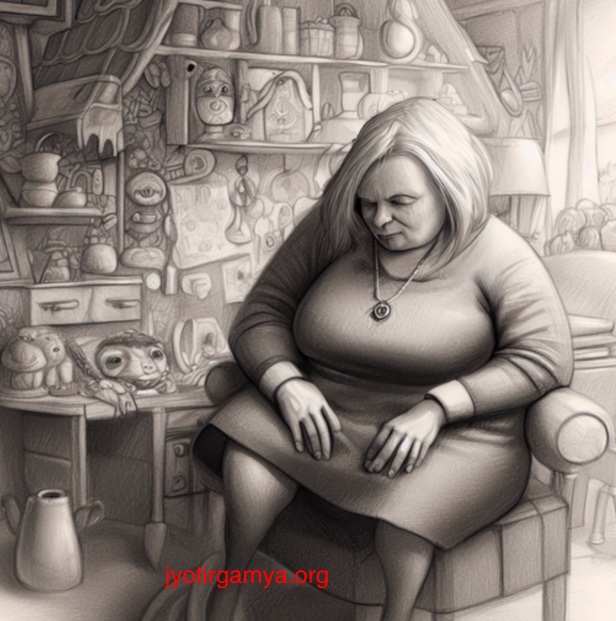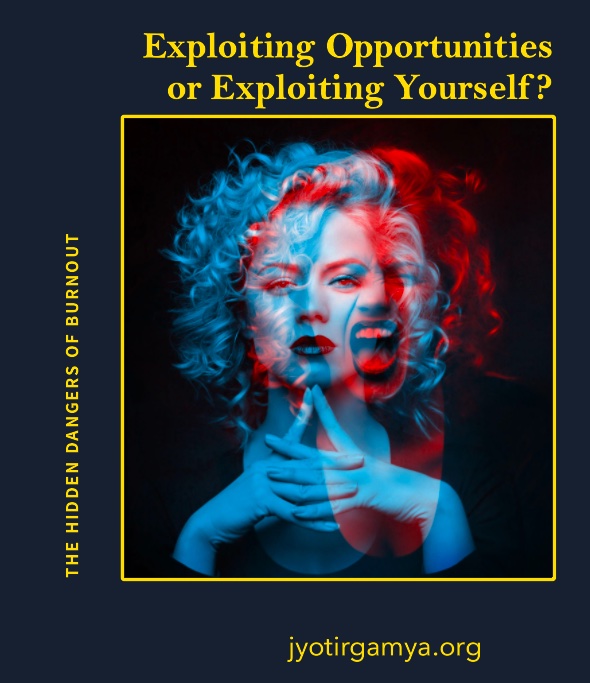Exploiting Opportunities or Exploiting Yourself? The Hidden Dangers of Burnout
Story
As Samantha briskly walked through the narrow streets of Bullsville, her mind was abuzz with schemes and plans. Her eyes darted from one opportunity to another as she meticulously calculated how to exploit each for her gain.
Samantha’s days were a whirlwind of activity. She would charm her way into social circles, make calculated investments, and manipulate situations to her advantage. Her reputation as a shrewd opportunist spread far and wide, and she reveled in the attention and success that came with it.
As time passed, Samantha began to feel the weight of her constant striving. She could not sleep at night, her mind racing toward her next move. Her once sharp wit dulled, and her once bright eyes dimmed.
One day, as Samantha was haggling with a merchant over the price of some goods, she suddenly felt a wave of fatigue wash over her. Her knees trembled, and she struggled to keep her composure. Finally, she excused herself and hurriedly made her way back to her cottage on the outskirts of Bullsville.
As Samantha entered her home, she sank onto a chair, feeling utterly drained. She looked around at the trinkets and treasures she had acquired through her opportunistic ways, and for the first time, she felt a pang of emptiness.

She realized she had been chasing after wealth and success without considering the toll it took on her well-being.
Her dear friend, Mary, knocked gently on the door and entered. She saw Samantha’s tear-streaked face and rushed to her side.
“Hey, Samantha, what’s wrong?” Mary asked with concern, placing a comforting hand on her shoulder.
Samantha looked up at Mary, her normally sharp eyes dull with fatigue. “I’m just so tired, Mary,” she confessed, her voice choked with emotion. “All this scheming, all this pursuit of opportunities, it’s taken a toll on me. I feel empty like I’ve lost sight of what truly matters.”
Mary nodded sympathetically, understanding Samantha’s struggle. “You’ve been pushing yourself so hard for so long, Samantha. It’s no wonder you’re feeling burned out. Maybe it’s time to step back and reassess what truly matters to you.”
Samantha’s burnout became increasingly apparent in her interactions with others. Short-tempered outbursts replaced her once smooth-talking ways, and her once calculating mind was clouded with fatigue. As a result, her reputation in the village began to suffer, and she found herself isolated and alone.
One day, as Samantha sat alone in her cottage, she had a moment of clarity. She realized that pursuing opportunities had come at the cost of her health and happiness. She realized that her cunningness and opportunism were not sustainable in the long run and that she had lost sight of the broader implications of her actions.
With a heavy heart, Samantha decided to change her ways. She thought of apologizing to those whom she had hurt or deceived with her cunning schemes. But, unfortunately, her ego came in the middle. It was a struggle for her to admit her mistakes.
She had to choose whether to sleep peacefully or stay awake with anxiety and depression.
She started consciously seeking more meaningful and ethical opportunities that would benefit her and the community around her.
At first, Samantha faced resistance and skepticism from those affected by her past actions. But she persevered, determined to make amends and rebuild her life based on integrity and empathy. Over time, her genuine efforts to change were recognized, and she began to regain the trust and respect of the villagers.
As the seasons changed, Samantha found solace in simpler things. She spent more time tending to her garden, listening to the laughter of children playing in the village square, and enjoying the company of true friends who valued her for who she was rather than what she could gain.
Ultimately, Samantha’s transformation was challenging but worth it. She learned that true success was not measured solely by wealth and status but by her impact on others and the contentment she found within herself. In addition, she understood that relying solely on cunningness and opportunism without considering the broader implications of her actions had led her to burnout and failure.
Introduction
The term “burnout” has become increasingly prevalent in recent years, with many individuals experiencing a sense of exhaustion, cynicism, and reduced efficacy in their work and personal lives. However, experts suggest that burnout is a complex phenomenon that requires a multifaceted approach to address its various causative factors, operating at individual, agency, and systemic levels. While some suggest increased self-care and finding more meaning in one’s work can prevent burnout, others emphasize the importance of recognizing the impact of one’s environment and taking steps to change it.

Expert Advice
“Review of available research by Francois Mathieu, Mark Hubble, and Scott Miller leads them to suggest that we are in a “pandemic of burnout” and conclude that the typical approach of increased self-care to address burnout is ineffective.
This is likely related to burnout being a complex phenomenon, as researcher Laurie Anne Pearlman suggested, who argued that any successful approach to burnout must simultaneously address causative factors operating at various levels: individual, agency, and system.
Other researchers, like organizational psychologist Adam Grant, conclude that burnout isn’t addressed by less work but rather by more meaning related to an increased sense of efficacy. Also related to meaning is Gabor Maté’s exploration of what he calls “Helper Syndrome.” He asks challenging questions like, “Have I done enough (in my efforts to help some)?” and “If I am not a professional helper, who would I be?” to explore the expectations that can put us at odds with the reality that even the most effective of us are never effective with everyone or all the time.
This more subtle and abstract aspect of burnout is echoed by Joan Borysenko, who says that at its core, burnout is a spiritual crisis related to meaning. This perspective on burnout is expressed by the poet David Whyte who said, “Anything that does not make you feel fully alive is too small for you.”
While I fundamentally agree with Whyte, this view can be misapplied to blame professional helpers for their burnout. When faced with complexity, our quest for simple answers often distracts us from asking challenging questions about the multiple personal and systemic factors that contribute to burnout and hence need to be addressed.”
“Firstly, recognize the importance of collective self cares. We are all connected in a myriad of ways. Developing and maintaining activities and practices that sustain and nourish our collective well-being is at the heart of protecting us from the possibility of “burnout.”
Prioritizing and normalizing ways of communicating that are caring and respectful and that ensure a tangible sense of reciprocal honoring is also at the core of enhancing our resilience and preventing burnout. As Kīngi Tāwhiao stated, “ki te kotahi te kakaho ka whati, ki te kāpuia e kore e whati” When we stand alone, we are vulnerable together, we are invincible.
Recognizing that focusing only on others can become an avoidance strategy is vital. When we begin to feel any sense of lack of control or self-determination in work and life, these circumstances can also be the basis of burnout.
Noticing our persistent irritability or a new short fuse, recent lack of libido, poor decision making, and tendency to sarcasm, feeling a bit “off.” And taking others' feedback seriously rather than brushing it aside. Others' comments feel like a personal attack, indicating that burnout could creep in.
Focus on sleep, nutrition, caring relationships, and communication basics. Get outdoors in nature. Sit under a tree. Connections with others and with the natural world will help.

Aroha, the Māori concept of love, compassion and empathy, sensitive reciprocity, and nurturing is an inexhaustible resource within you and the world around you.”
“In my view, it out is a mind/ body/spirit’s way of saying that the person is highly depleted and needs to engage in a lifestyle/ activities that will increase their primary resources to help them to re-a liberate to a normal state.
They may take a break from work, reduce the demanding aspect of life, seek support from families and friends, and follow self-care practices like yoga, mindfulness, spiritual awareness, exercise, etc.
We must remember that we are not an island and need each other. So often, people at this level isolate themselves as they feel inadequate. Asking for help and letting people know that one is not coping is the first step towards well-being and recovery.”
“Do not normalize burnout or see it as exclusively your problem with adjusting to a particular work culture. For example, some work environments are toxic, ask too much of workers, or ignore bullying.
Finding a way to carry on that does not also look at how the work environment could be better allows this culture to continue and expand. Your health is not worth ruining. Sometimes you have to leave and find other work.”
“John Shotter says that context is everything. So if your friendship is getting stale, for example, don’t meet that person in the same place - go for a walk together, have a coffee, or do anything different.
The same applies to burnout - simple changes in routine, setting, a new task, etc., can assist. For me, it has been reducing to a 4-day week, changing jobs, etc.”
Conclusion
In conclusion, burnout is a pervasive and complex phenomenon requiring a holistic approach. Experts emphasize the importance of recognizing the impact of one’s environment, engaging in collective self-care, finding more meaning in one’s work, and making changes to one’s routine, among other strategies. It is essential to take burnout seriously, recognize the signs, and take proactive steps to prevent it from becoming pervasive and debilitating.
If you think someone would benefit from the article, please do share it with them.
Want to stay connected? Here’s our twitter.
Related Articles :